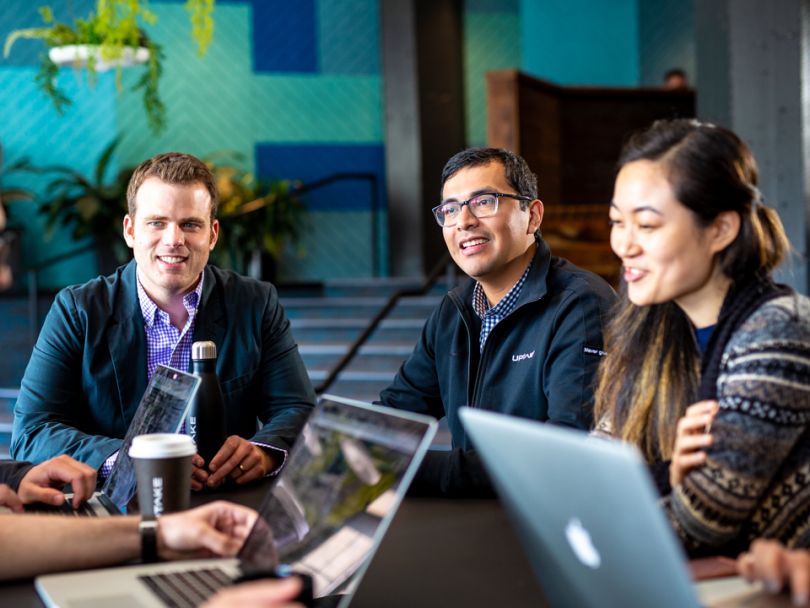Top-down transparency, significant autonomy and shared rewards are just a few of the ways Uptake has grown its data science team into a powerhouse.
With clients like Berkshire Hathaway Energy, Pattern Energy and the U.S. Army, expectations for the quality of Uptake’s analysis are high. Even when tackling the “messy” data of industrial machines, Uptake is leveraging its know-how and strong internal culture to provide growth opportunities for its employees and essential solutions and tools for its customers.



FOUNDED: 2014
EMPLOYEES: 700
WHAT THEY DO: Provide industrial AI software, built on data pulled directly from the machines companies use, to increase efficiency and productivity.
WHERE THEY DO IT: Chicago, IL
WHO THEY DO IT FOR: Energy, oil and gas, manufacturing and transportation companies seeking to leverage their machine data.
PERKS: In addition to fully-stocked kitchens, Uptake offers employees an inventor incentive program: anyone who submits a viable idea for new intellectual property is eligible for an award of up to $2,000 and named as an inventor on any U.S. patents granted.
IDEAL CANDIDATE: Data scientists who can work in all stages of a project, from helping customers translate business problems into data science terms to writing production code. With a strong culture of open source contributions, Uptake focuses on candidates who demonstrate collaboration and continuous learning.
FUN FACT: Up, up and away: market analysis by Pitchbook found that Uptake is the fastest U.S. startup to reach a valuation of $2 billion.


Adam McElhinney, Vice President of Data Science
WHAT HE LOVES ABOUT HIS JOB: Rolling up his sleeves and reviewing the latest algorithms and features that Uptake is delivering.
How large is Uptake’s data science team and what steps have you taken to develop a robust team culture?
I manage a team of about 70 data scientists and software engineers who use data to ensure that industrial machines never fail and operate as efficiently as possible. To maximize the value of the team, we’ve made huge investments in defining what we want the culture to be and executing on that definition.
Our primary goal of creating a culture that values curiosity and continuous improvement drives all of our culture initiatives. We host 8-12 courses for our data science and software engineering teams per month! We also do a quarterly hack day, where we go offsite and work on whatever we want. Additionally, we routinely sponsor team members to speak at and attend various events.
We place much more of an emphasis on end-to-end project ownership compared to other data science teams."
What steps do you take during the hiring process to ensure that every new hire is a good culture fit at Uptake?
We published an article called “Good Data Scientist/Bad Data Scientist,” which our people managers wrote as an exercise. We send it to every candidate who comes onsite to interview with us. We ask candidates for their opinion on the article.
We place much more of an emphasis on end-to-end project ownership compared to other data science teams. We want candidates to know that and decide if this is the type of department in which they want to work.
How does Uptake structure its development and feedback processes?
Every significant deliverable, whether it’s code, a new model or a whole new class of algorithms, goes through an exhaustive peer-review process. We have strict standards around what this process looks like.
For example, you must have at least one person that is not on your direct working team review your project. That promotes cross-team collaboration and prevents one team from developing groupthink. The process also enforces consistent code style, documentation and quality across the department. We’ve found that the learning goes both ways: even if you are the one doing the reviewing, you learn how others have tackled certain problems and then take that back to your own daily work.


Patrick Boueri, Senior Manager, Data Science
BEYOND WORK: Boueri just got back into boxing after a hiatus. He also loves taking in the U.S. Supreme Court’s arguments and opinions, and the way the court works to make complex problems more tractable.
How would you define culture? In what way does your team reflect something important about that definition?
I think about culture a lot. It's the sum of personalities within a company but framed through the personalities and examples set by leaders. I'd say it's both emergent and a guided property of a company or any group of people.
Compared to other companies in my past and those I’ve heard of, Uptake as a whole has a strong desire to be impactful and different. In the case of the data science team, we fully support each other. There's no posturing or scrambling to claim credit. We're a team and mesh like one, a team where anyone can get thoughtful answers in response to asking a question.
What kind of autonomy does a data scientist at Uptake have?
We are our own project managers and set our own goals in line with the company’s objectives. The autonomy of setting your goals at the team level gives you a lot of flexibility in prioritizing work you think is impactful while remaining on the hook for the high-level objective of your team. I could tell you that I want you to save 100 machine failures this quarter, but how you do that is up to you. That provides incentives to try novel methods to push the limit in terms of methods, while balancing proven methods against known ones, and risk against reward.
Work is a social experiment that largely goes unnoticed, so to make our feedback explicit allows us to have a meaningful conversation about the way we work together."
How has your team leadership created a culture of productive feedback?
One day, Adam McElhinney, unsolicited, sent a spreadsheet to the people he works closely with detailing all the positive and negative feedback he had received over the past quarter, and invited everyone to comment on it and provide even more. It was a revelation, to be given permission to share your performance openly with those you work with.
Work is a social experiment that largely goes unnoticed, so to make our feedback explicit allows us to have a meaningful conversation about the way we work together. I immediately copy-catted and sent out my own version, which I periodically refresh. It's so valuable to have others hold you accountable for how you should improve, as well as freeing because you are candid with something we generally guard closely at work.


Stephanie Kirmer, Data Scientist
BEYOND WORK: Kirmer is on the Shortlist Committee at the Chicago Humanities Festival, and mentors a high school student, who just graduated and has enrolled in college for the fall 2018 semester, through the iMentor program.
What would you say is one of the biggest challenges you interact with daily at Uptake?
One of our biggest technical challenges is getting from unstructured, messy data that our customers may have in-house, to orderly data we can use for predictions and insights. This is a very interesting and thought-provoking problem: How do we scale our analytic capabilities when data is inevitably imperfect?
We have a ton of smart people here working on this issue and building tools that allow us to make the most out of customers’ data, and I’m fascinated by all the possibilities. Building models and deriving insights from tidy, structured data is sometimes seen as the glamorous work of data science, but I don’t think it’s nearly as interesting as working on imperfect, real-world data and making it sing.
What is something about the average day at Uptake that you enjoy?
It’s hard to imagine an average day here. Data scientists at Uptake have a lot of different roles and do so many things! One of the things I like is that we get plenty of time to focus and concentrate. When you’re writing code and solving complicated problems, you need time to think with minimal distraction.
We don’t have a culture of constant meetings, so we get the uninterrupted time we need. The leadership of data science here really cares about that and makes it a priority. We also have quiet spaces in the office where you can get work done with fewer distractions.
Building models and deriving insights from tidy, structured data is sometimes seen as the glamorous work of data science, but I don’t think it’s nearly as interesting as working on imperfect, real-world data and making it sing."
How does the onboarding process at Uptake set employees on a good growth trajectory?
New hire orientation has a lot of focus on the culture of Uptake generally, which I really appreciated when I was getting started. Within data science, we make sure new folks know how to get help and guidance when they are stuck because there’s so much to learn in a short time.
Getting people into our team’s culture of support and teamwork is important, so from the start, we make sure they feel included. It’s easy to feel intimidated when you’re new in a high-performing environment with brilliant colleagues, and we don’t want new members of the team to feel that way.


Manny Bernabe, Data Science Lead
BEYOND WORK: Bernabe is a history buff, particularly when it comes to the antiquity — he even gave a well-attended talk at Uptake on the Punic Wars.
How do you address the need for solutions with far-reaching impact for your industrial customers?
Our biggest challenge is prioritizing the many ways in which AI and machine learning can help our customers. Machine intelligence is booming, and we have to be focused when it comes to building functionalities and delivering world-class software. We do this by leveraging internal industrial domain expertise and by working closely with our customers across the industrial sector.
How do you apply your experience from previous roles to your work at Uptake?
Previous to Uptake, I spent time in the financial services industry researching quantitative investment strategies and building investment products called exchange-traded funds, or ETFs. I’m used to working with really smart and disciplined people. What's different about Uptake’s data science team is that in addition to being super bright, the team is also very collaborative. Team members have a passion for sharing knowledge.
What's different about Uptake’s data science team is that in addition to being super bright, the team is also very collaborative. Team members have a passion for sharing knowledge."
What opportunities do data scientists at Uptake have to interact directly with customers?
I love hosting cross-functional customer teams at Uptake of individuals like technologists, business leaders and operators to narrow down AI and digital innovation strategies. The value that machine intelligence can bring to a customer’s workflow can be vast. I enjoy having stakeholders in a room to flesh out the highest value and most feasible opportunities for their businesses.



